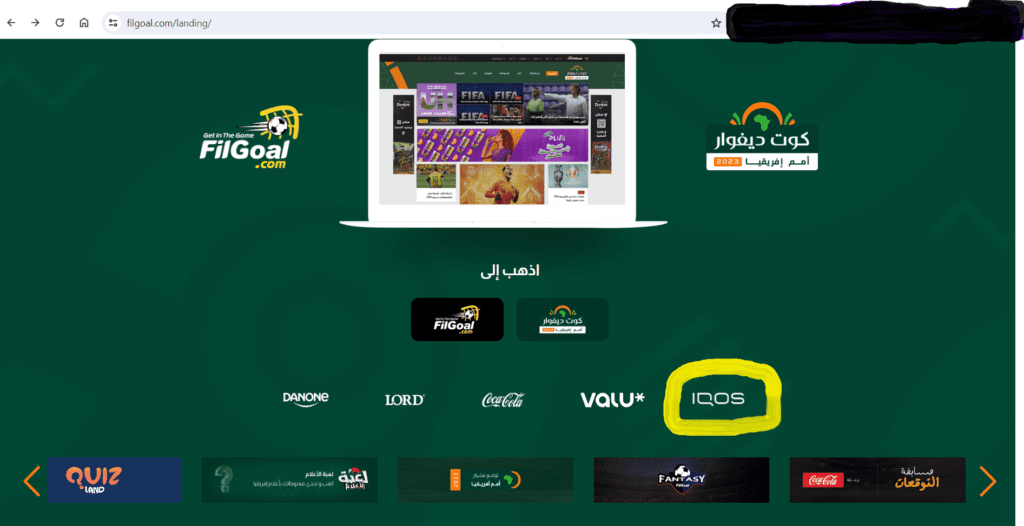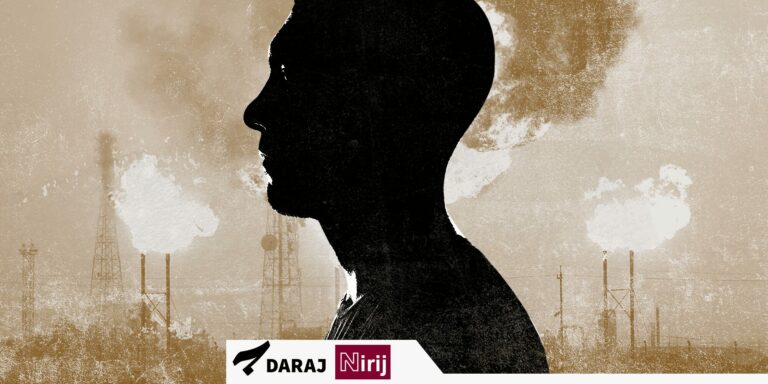Three years ago, foreign tobacco companies began introducing heated tobacco products into the Egyptian market, starting with British American Tobacco launching its heated tobacco product under the name Glo, followed by Philip Morris International (PMI), which began offering IQOS.
So, what’s the story?
In March 2021, the Egyptian Ministry of Health issued Decision No. 79 of 2021, approving heated tobacco as a type of cigarette available in the Egyptian market, defining it as “a product made from raw tobacco, with or without the addition of other components, and heated using a heating device without any burning or combustion. This tobacco may come in the form of cigarettes, capsules, or other shapes.”

After British American Tobacco launched its heated tobacco product, adhering to the executive regulations of Law No. 52 of 1981 concerning tobacco harm prevention and government instructions to print a warning image on heated tobacco packages as is done with traditional cigarette packages, PMI, the owner of IQOS, objected to the decision of the Egyptian Ministry of Health. They requested to only include a warning statement without an image, arguing that the small size of their cigarette pack made it impractical to include a warning image.
During this period, a shipment of IQOS cigarettes was halted at Egyptian ports due to non-compliance with the standard requirement to place a warning image on their packages. However, the shipment was exempted from the Ministry of Health’s decision, allowing the IQOS to be marketed without a warning image and only a warning statement. This was confirmed by a senior source in the tobacco and cigarette market in Egypt.


A former source at British American Tobacco, who requested anonymity, stated that the company complied with the regulations and laws governing the Egyptian market, launching its heated tobacco product, Glo, with warning images covering 50 percent of the package size in accordance with the Ministry of Health’s decisions in this regard. He confirmed that the company was not granted any exemptions like the competing company producing the IQOS cigarettes.
The Egyptian Cabinet Intervenes to Remove Warning Images
In a document obtained, marked “Highly Confidential – Urgent,” addressed from the Egyptian Prime Minister to the then Minister of Health, the following was stated:
Arab Republic of Egypt – Prime Minister’s Office – General Secretariat – (Highly Confidential – Urgent) – Dr. Hala Zayed – Minister of Health and Population. Greetings.
“Please be informed that a memorandum from the Administrative Control Authority regarding a complaint from British American Tobacco about the warning images on heated tobacco has been received. The memorandum includes the Authority’s assessment of the situation(…) PMI officials have been in contact with you regarding granting their company, which operates in the field of selling heated tobacco products, the authority to remove the warning images depicting the risks of smoking on heated tobacco packages and to suffice with warning statements only. The decision in this regard will result in British American Tobacco incurring financial losses of approximately $20 million due to its compliance with your esteemed ministry’s instructions. Additionally, there are some obstacles faced by electronic cigarette importing companies despite the issuance of the Egyptian Standard Specification No. 8205-1-2018 concerning the circulation of electronic cigarettes, indicating a lack of coordination between state agencies in this regard.”


When asked about the lack of warning images on IQOS packages, a senior source in the Egyptian Ministry of Health, who requested anonymity, said: “We found that the size of the package was not suitable for both the image and the text together, which prompted the ministry to issue Decision No. 79 of 2021, allowing the use of the following warning statement only: “Smoking is harmful to health and causes death.”
The New License for Cigarette Manufacturing
In 2022, PMI obtained a license to manufacture cigarettes in Egypt, granting them the right to produce three types of cigarettes, including heated tobacco. This license was shrouded in much ambiguity, criticism, and lack of transparency after British American Tobacco, Nakhla, and Al Mansour Holding Company withdrew from the bid for the new license, citing that the new bidding conditions would create a quasi-monopolistic situation in the cigarette market.
After obtaining the new license, PMI began to spread the IQOS product more widely in Egypt. Violations of the tobacco control law did not stop at the absence of warning images on cigarette packages, but the products also began to be advertised directly and indirectly, whether on news websites or by placing large kiosks inside major shopping malls and fuel stations.
The WHO Framework Convention on Tobacco Control
The World Health Organization emphasizes that heated tobacco products are tobacco products, meaning that the provisions of the Framework Convention fully apply to these products (Decision FCTC/COP8(22)). Specifically, Article 13-4 (a) obliges parties to prohibit “all forms of tobacco advertising, promotion, and sponsorship that promote a tobacco product by any false, misleading, deceptive, or other means that may create an erroneous impression about its characteristics, health effects, hazards, or emissions.”
Egypt was among the countries that signed the WHO Framework Convention on Tobacco Control in 2003, in which all parties agreed to impose a comprehensive ban on tobacco advertising, promotion, and sponsorship. The convention stipulates that each party, in accordance with its constitution or constitutional principles, must impose a comprehensive ban on all forms of direct and indirect tobacco advertising to reduce tobacco product consumption. This is encompassed by Law No. 52 of 1981 and its amendments.


Violation of Tobacco Control Law
When asked about the absence of warning images on heated tobacco products in Egypt, Dr. Fatma El Awa, Advisor to the Tobacco Control Initiative at the WHO Eastern Mediterranean Regional Office, said, “The World Health Organization is unaware of the reasons for this.”
She clarified that this type of heated tobacco, the IQOS, violates the Tobacco Control Law and its implementation, with one of these violations being the absence of warning images on cigarette packages, as images should be placed on all tobacco products to reduce smoking.
Dr. El Awa added that IQOS cigarettes pose a danger to youth due to their availability in public places and the spread of their advertisements in shopping malls and gas stations. She noted that these products are not subject to health warnings or the same taxes as traditional cigarettes.
Dr. El Awa also pointed out the prevalence of IQOS products in drama works, indicating that this constitutes clear advertising of the product, which violates the law prohibiting any form of tobacco product advertising.
Safwat noted that the second breach of heated tobacco products lies in the violation of the advertising ban. They are everywhere, with young men and women promoting these products in places such as major shopping malls and gas stations, using attractive displays and misleading advertisements, offering discounts targeting youth, and promoting heated tobacco products as less harmful and a safer alternative to traditional cigarettes.
Regarding the advertising of heated tobacco products, the senior source at the Ministry of Health stated that some scenes in dramas and films contain smoking scenes, especially using the IQOS, confirming that this encourages smoking. The role of the Ministry of Health is to spread awareness through periodic workshops for scriptwriters and directors, warning against promoting smoking through scenes. Additionally, interpellations are submitted in the House of Representatives for the same reason.
Phil Chamberlain, the deputy director of the Tobacco Control Research Group at University of Bath, said: “This is not the first time we have seen the tobacco industry undermine international and national regulations. Therefore, it is important for policy makers to be aware of industry tactics and to stop any privileges provided to tobacco companies. This is not only a requirement of international tobacco laws, but also the right action to protect public health in a country where almost one quarter of its population are smokers.”
On the expansion of PMI in the Egyptian market, Phil Chamberlain said: “This proves once more that PMI is a company that prioritizes its profits over the health of people everywhere.”


Health Risks of Heated Tobacco
The World Health Organization states on its official website that “reducing exposure to harmful chemicals in heated tobacco products does not make them harmless, nor does it lead to a reduction in health risks. In fact, the levels of some toxic substances found in the aerosol generated by heated tobacco products are higher than those found in the smoke of conventional cigarettes. Additionally, the aerosol of heated tobacco products contains other toxic substances not found in cigarette smoke. The health effects of exposure to these toxic substances remain unknown.”
The organization further explains: “Despite claims of ‘risk reduction,’ there is no evidence that heated tobacco products are less harmful than traditional tobacco products. While some toxic substances in regular tobacco smoke are found at much lower levels in the aerosol of heated tobacco products, the aerosol contains other toxic substances, sometimes at higher levels than those in tobacco smoke, such as glycidol, pyridine, dimethyl sulfide, acetoin, and methylglyoxal. Moreover, some toxic substances present in the aerosol of heated tobacco products are not found in traditional cigarette smoke and may have associated health effects. These products are highly variable, and some of the toxic substances in their emissions are carcinogens.”
Dr. Wael Safwat, President of the Egypt Health Foundation, member of the Egyptian Tobacco Control Platform, and President of the Arab Tobacco Control Union, stated that heated tobacco, particularly vape products in Egypt, violates anti-smoking laws and policies as they are sold without a pictorial warning on the packages.
He pointed out that since 2008, Egypt has been the only country in the Eastern Mediterranean region to use pictorial warnings on half of cigarette packs on both sides, as well as on shisha packs, and included a quitline number, making it one of the 10 or 15 countries globally to implement this type of warning at that time.
Safwat emphasized that the Egyptian state must require manufacturers of products like the vape or IQOS to include pictorial warnings, saying: “The packaging is cleverly designed to be small in size to avoid placing pictorial warnings on them, which is a way for tobacco companies to circumvent the laws.”
He explained that different methods have been implemented in some countries to place pictures and warnings despite the small size, as well as on vape products. The purpose of requiring companies to include pictures is so that people do not think these products are different or less harmful, as many believe, and as manufacturers claim. Safwat said: “Companies use misleading phrases that these products reduce harm by 95% compared to traditional products, which is not true.” He confirmed that these companies and manufacturers sell products containing 5 percent toxins, and research confirms they have many different toxins from other tobacco products that cause different harms.
On its official website promoting the product, the IQOS manufacturer states that “switching completely to using the IQOS device is less harmful than continuing to smoke” and “Important information: Although the IQOS device does not produce tar, it is not without risks as it provides nicotine, which is an addictive substance.”
The manufacturer explains on its website that “the IQOS device is a better option than continuing to smoke. The IQOS device emits 95 percent less harmful chemicals compared to cigarettes. Since the IQOS device emits less smell than cigarettes, it is less likely to bother the people around you. The IQOS device leaves less smell on hands, hair, and clothes compared to cigarettes.”
Safwat emphasized the necessity of preventing companies from misleading the public about the existence of less harmful products, explaining that these products are toxic and addictive, as acknowledged by the producing companies. Stating that nicotine causes addiction, and it is part of the cigarette regardless of its form. Heated tobacco contains glycerin, essential oils, and flavors that are very harmful when heated.
He explained that there are global conditions to limit the spread of tobacco products, including MPOWER measures, which align with the world’s first health treaty, the WHO Framework Convention on Tobacco Control. This convention emphasizes banning smoking in enclosed and public places, offering various forms of help for people to quit smoking, placing health warnings on tobacco products, banning direct and indirect advertising, raising the prices of tobacco products, and regulating and controlling the contents of tobacco products.
When asked about the harms of heated tobacco, a source from the Egyptian Ministry of Health said: “Heated tobacco cigarettes are not less harmful than traditional cigarettes; they may even be more harmful because they contain a set of chemicals that could cause serious lung damage.”
Increase in Heated Tobacco Users
Forty-year-old Mohamed Adel, an owner of a tobacco supplies shop in Hada’iq al-Qubbah, Cairo, stated that sales of heated tobacco products like IQOS have significantly increased in recent months, especially amid the cigarette crisis in the Egyptian market, by up to 50 percent compared to traditional products.
Adel explained that many young people are shifting away from traditional cigarettes and opting for heated tobacco, particularly those aged 25 years old, saying: “For them, smoking heated tobacco is like a fashion.”
Regarding the warning image on cigarette packages, Adel said: “Heated tobacco packages are the only ones allowed on the market without a warning image.”
Milad Hanna, a distributor of tobacco products in Shubra, Cairo, confirmed that sales of heated tobacco products like IQOS increased last year, especially with the rising prices of traditional cigarettes. He noted that the stable price of IQOS packs and their availability everywhere helped in their spread and increased sales.
Milad stated that his IQOS sales reach about 300 packs daily, pointing out that the packaging and the lack of a warning image on it encouraged smokers to buy it, saying: “Some people sometimes don’t like the image on the cigarette pack, so they don’t buy it.”
According to data from PMI, it is expected that the number of smokers worldwide will reach about one billion by 2025, prompting the company to consider providing alternative products different from traditional smoking. The company developed the heated tobacco product IQOS, now available in about 71 markets worldwide.
PMI states that 30 percent of the company’s global revenue comes from sales of alternative smoking products, including heated tobacco, and it aims to increase this percentage to 50 percent by 2025, equivalent to one billion dollars.
PMI indicates that the number of IQOS users currently stands at approximately 18 million worldwide, with 12.7 million having completely switched to the alternative product. The company aims to reach 40 million users by 2025.





